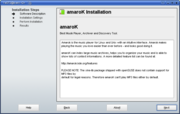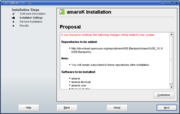Standaarden/Eénkliksinstallatie
Inhoud
One click installation of packages
Use case
- Allow the user to install package(s) from (a) repositor(y|ies) (he|she) may or may not have in (his|her) system repositories.
Scope
- In scope is automating the process of the package manager adding repositories and installing packages.
- In scope is presenting the user with sufficient information to understand the automated process.
- Out of scope is any package management details such as package dependencies.
Requirements
- Action must be triggered with a one click.
- Should be possible to include trigger on web page
- Should be possible to include trigger on physical media for ISVs
- Security (user should confirm adding of sources)
- Should be possible to override auto-detection of repository type.
- Should be possible to include multiple mirrors
- Should be possible to have multiple translations of strings.
- Should be possible to have one button/file to click on to install the product(s) for any version of the distribution.
- Files should not need to be very big (translations optional etc) so download time is negligible.
- It should be possible to specify how to resolve common conflicts (e.g. compiz/beryl)
Dependencies
- No good way to unique identify repositories (url? hash? id? )
Proposed Standard
Specification
#
# RELAX NG Schema for Metapackage Specification
#
# Derived from the XSD Schema found at
# http://en.opensuse.org/Standards/One_Click_Install
#
# Author: Thomas Schraitle <thomas DOT schraitle AT suse.de>
#
namespace rng = "http://relaxng.org/ns/structure/1.0"
datatypes xsd = "http://www.w3.org/2001/XMLSchema-datatypes"
default namespace ps = "http://opensuse.org/Standards/One_Click_Install"
start = y.metapackage
div {
c.lang.attrib =
## A natural language
attribute lang { xsd:language } #
c._any.attrib =
## Any attribute from any namespace
attribute * { text }
c.architecture.attrib =
## ???
attribute architecture { text }
c.recommended.attrib =
## Is this repository recommended?
attribute recommended { xsd:boolean }
c.type.attrib =
## ???
attribute type { text }
c.mirrorableURL = text
c.translateableString = text
}
div { # metapackage
y.metapackage =
## The root element
element metapackage
{
y.metapackage.attlist,
y.group+
}
y.metapackage.attlist =
c._any.attrib*
}
div { # group
y.group =
## Groups repositories
element group
{
y.group.attlist,
y.name?,
y.summary?,
y.description?,
y.remainsubscribed?,
y.repositories,
y.software
}
y.group.recommended.attrib = c.recommended.attrib
y.group.distversion.attrib =
## The version of the grouped repository
attribute distversion { text }
y.group.attlist =
y.group.recommended.attrib?
& y.group.distversion.attrib?
}
div { # name
y.name =
## The name of a group, repository or software
element name
{
y.name.attlist,
text
}
y.name.attlist = empty
}
div { # summary
y.summary =
## A summary of a group, repository or software
element summary
{
y.summary.attlist,
c.translateableString
}
y.summary.attlist = c.lang.attrib?
}
div { # description
y.description =
## A description of a group, repository or software
element description
{
y.description.attlist,
c.translateableString
}
y.description.attlist = c.lang.attrib?
}
div { # remainSubscribed
y.remainsubscribed =
## Should the user remain subscribed to these repository?
element remainSubscribed
{
y.remainsubscribed.attlist,
xsd:boolean
}
y.remainsubscribed.attlist = empty
}
div { # repositories
y.repositories =
## A list of required repositories for this installation
element repositories
{
y.repositories.attlist,
y.repository*
}
y.repositories.attlist = empty
}
div { # repository
y.repository =
## A repository with name, summary, description and url
element repository
{
y.repository.attlist,
y.name,
y.summary+,
y.description+,
y.url+
}
y.repository.recommended.attrib = c.recommended.attrib
y.repository.format.attrib =
## The format of the repository
attribute format { text }
y.repository.producturi.attrib =
## ???
attribute producturi { text }
y.repository.attlist =
y.repository.recommended.attrib?
& y.repository.format.attrib?
& y.repository.producturi.attrib?
}
div { # software
y.software =
## A list of software items to install
element software
{
y.software.attlist,
y.item*
}
y.software.attlist = empty
}
div { # item
y.item =
## A software item to install
element item
{
y.item.attlist,
y.name,
y.summary+,
y.description+
}
y.item.action.attrib =
## ???
attribute action { text }
y.item.architecture.attrib = c.architecture.attrib
y.item.recommended.attrib = c.recommended.attrib
y.item.type.attrib = c.type.attrib
y.item.attlist =
y.item.action.attrib?
& y.item.architecture.attrib?
& y.item.recommended.attrib?
& y.item.type.attrib?
}
div { # url
y.url =
## An URL pointing to a repository
element url
{
y.url.attlist,
c.mirrorableURL
}
y.url.score.attrib =
## ???
attribute score { xsd:integer }
y.url.location.attrib =
## ???
attribute location { text }
y.url.attlist =
y.url.score.attrib?
& y.url.location.attrib?
}
Example
<xs:schema xmlns:xs="http://www.w3.org/2001/XMLSchema"
targetNamespace="http://opensuse.org/Standards/One_Click_Install"
xmlns:os="http://opensuse.org/Standards/One_Click_Install"
xmlns="http://www.w3.org/2001/XMLSchema" elementFormDefault="qualified"
attributeFormDefault="unqualified">
<xs:complexType name="softwareitem">
<xs:sequence>
<xs:element name="name" type="xs:string" minOccurs="1" maxOccurs="1"/>
<xs:element name="summary" type="os:translatableString" minOccurs="1" maxOccurs="unbounded"/>
<xs:element name="description" type="os:translatableString" minOccurs="1" maxOccurs="unbounded"/>
</xs:sequence>
<xs:attribute name="type" type="xs:string" default="package"/>
<xs:attribute name="recommended" type="xs:boolean" default="true"/>
<xs:attribute name="architectures" type="xs:string" default="all"/>
<xs:attribute name="action" type="xs:string" default="install"/>
</xs:complexType>
<xs:complexType name="repository">
<xs:sequence>
<xs:element name="name" type="xs:string" minOccurs="1" maxOccurs="1"/>
<xs:element name="summary" type="os:translatableString" minOccurs="1" maxOccurs="unbounded"/>
<xs:element name="description" type="os:translatableString" minOccurs="1" maxOccurs="unbounded"/>
<xs:element name="url" type="os:mirrorableURL" minOccurs="1" maxOccurs="unbounded"/>
</xs:sequence>
<xs:attribute name="recommended" type="xs:boolean" default="true"/>
<xs:attribute name="format" type="xs:string" default="auto"/>
<xs:attribute name="producturi" type="xs:string" default="/"/>
</xs:complexType>
<xs:complexType name="translatableString">
<xs:simpleContent>
<xs:extension base="xs:string">
<xs:attribute name="lang" type="xs:string" />
</xs:extension>
</xs:simpleContent>
</xs:complexType>
<xs:complexType name="mirrorableURL">
<xs:simpleContent>
<xs:extension base="xs:string">
<xs:attribute name="score" type="xs:integer" default="10" />
<xs:attribute name="location" type="xs:string"/>
</xs:extension>
</xs:simpleContent>
</xs:complexType>
<xs:complexType name="group">
<xs:sequence>
<xs:element name="name" type="xs:string" minOccurs="0" maxOccurs="1"/>
<xs:element name="summary" type="os:translatableString" minOccurs="0" maxOccurs="1"/>
<xs:element name="description" type="os:translatableString" minOccurs="0" maxOccurs="1"/>
<xs:element name="remainSubscribed" type="xs:boolean" minOccurs="0" maxOccurs="1"/>
<xs:element name="repositories">
<xs:complexType>
<xs:sequence>
<xs:element name="repository" minOccurs="0" maxOccurs="unbounded" type="os:repository"/>
</xs:sequence>
</xs:complexType>
</xs:element>
<xs:element name="software">
<xs:complexType>
<xs:sequence>
<xs:element name="item" minOccurs="0" maxOccurs="unbounded" type="os:softwareitem"/>
</xs:sequence>
</xs:complexType>
</xs:element>
</xs:sequence>
<xs:attribute name="recommended" type="xs:boolean" default="true"/>
<xs:attribute name="distversion" type="xs:string"/>
</xs:complexType>
<xs:element name="metapackage">
<xs:complexType>
<xs:sequence>
<xs:element name="group" type="os:group" minOccurs="1" maxOccurs="unbounded"/>
</xs:sequence>
</xs:complexType>
</xs:element>
</xs:schema>
Sample instance:
<metapackage xmlns:os="http://opensuse.org/Standards/One_Click_Install" xmlns="http://opensuse.org/Standards/One_Click_Install">
<group distversion="openSUSE Factory">
<name>ymp name</name>
<summary>ymp summary</summary>
<description>ymp description, visible on welcome page</description>
<repositories>
<repository recommended="true" format="yast">
<name>Main Repository</name>
<summary>This is the main openSUSE catalogue</summary>
<summary lang="en_US">This is the main openSUSE catalog</summary>
<description>This is the main openSUSE package repository containing blah blah blah</description>
<description lang="de">Insert German Here</description>
<url>http://download.opensuse.org/distribution/SL-OSS-factory/inst-source</url>
<url score="5" location="ie">http://ftp.heanet.ie/mirrors/ftp.opensuse.org/opensuse/distribution/SL-OSS-factory/inst-source</url>
</repository>
<repository recommended="false">
<name>Some Other Repo</name>
<summary>Blah Blah</summary>
<description>blah blah blah</description>
<url>http://example.com</url>
</repository>
</repositories>
<products>
<product>
<name>MyFavouritePackage</name>
<summary>This is my favourite package</summary>
<summary lang="en_US">This is my favorite package</summary>
<description>Blah blah blah</description>
</product>
<product type="pattern">
<name>SomePattern</name>
<summary>Demo other resolveable</summary>
<description>Blah blah blah</description>
</product>
</products>
</group>
<group distversion="openSUSE 10.2">
<repositories>
<repository>
<name>Main Repository</name>
<summary>This is the main openSUSE catalogue</summary>
<description>This is the main openSUSE package repository containing blah blah blah</description>
<url>http://ftp.heanet.ie/mirrors/ftp.opensuse.org/opensuse/distribution/10.2/repo/oss/</url>
</repository>
</repositories>
<software>
<item>
<name>MyFavouritePackage</name>
<summary>This is my favourite package</summary>
<summary lang="en_US">This is my favorite package</summary>
<description>Blah blah blah</description>
</item>
</software>
</group>
</metapackage>
Implementations
A partial implementation was introduced in the betas of openSuse 10.3.
Hieronder staat de oude tekst van deze pagina. Deze kan mogelijk gebruikt worden in de hier boven aanwezige Engelse tekst
Eénkliksinstallatie
Overzicht
Eénkliksinstallatie maakt het makkelijk voor gebruikers om software te installeren onafhankelijk van waar die software staat.
In het verleden zouden gebruikers instructies hebben moeten volgen over het hoe een installatiebron toe te voegen en dan zekere pakketten te kiezen voor installatie. Nu hoeft een gebruiker alleen op een koppeling te klikken op een webpagina of op een setup-bestand op een CD. Door dat te doen krijgt hij of zij een assistent te zien die hem of haar door de installatie leidt.
Als u een openSUSE gebruiker bent, dan heeft u waarschijnlijk deze installatie links op verschillende plekken opgemerkt.
Eénkliksinstallatie maakt gebruik van een speciaal bestandstype genaamd YMP. In dit YMP bestand staan instructies welke pakketten geïnstalleerd moeten worden, en waar deze staan. Het is feitelijk een uitleg die voor systeem duidelijk is, hoe de software te installeren.
Het is mogelijk om in één bestand instructies te specificeren voor meerdere besturingssystemen. Dus het toevoegen van éénkliksinstallatie ondersteuning in een andere distributie, is gewoon een kwestie van het toevoegen van een toepassing die één van deze instructie-bestanden neemt, en omzet in instructies voor uw eigen pakket beheer.
Software Verkopers
Als u een software verkoper of ontwikkelaar bent, en wilt de éénkliksinstallatie gebruiken om uw software eenvoudig te installeren te maken door openSUSE gebruikers, bekijk de ISV Page.


